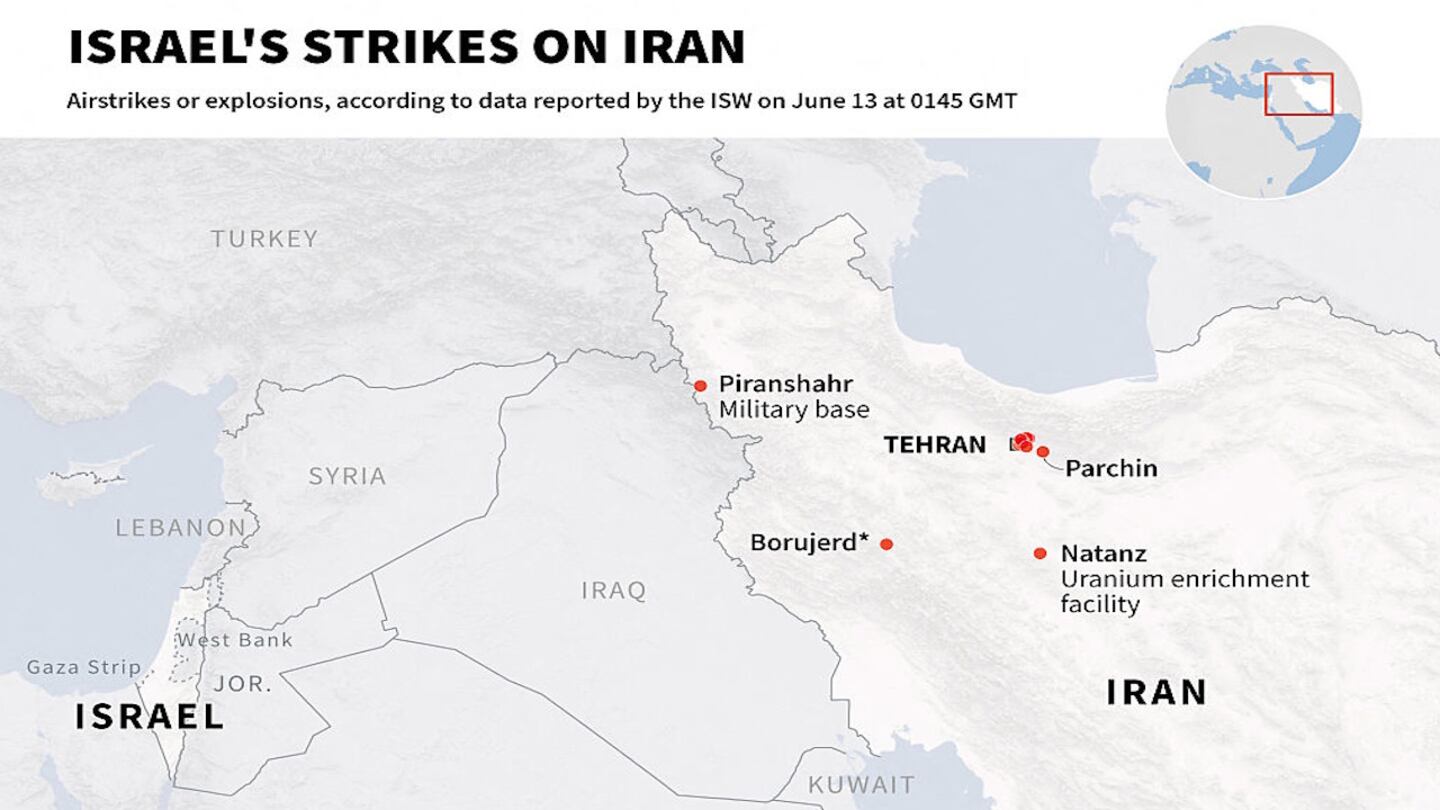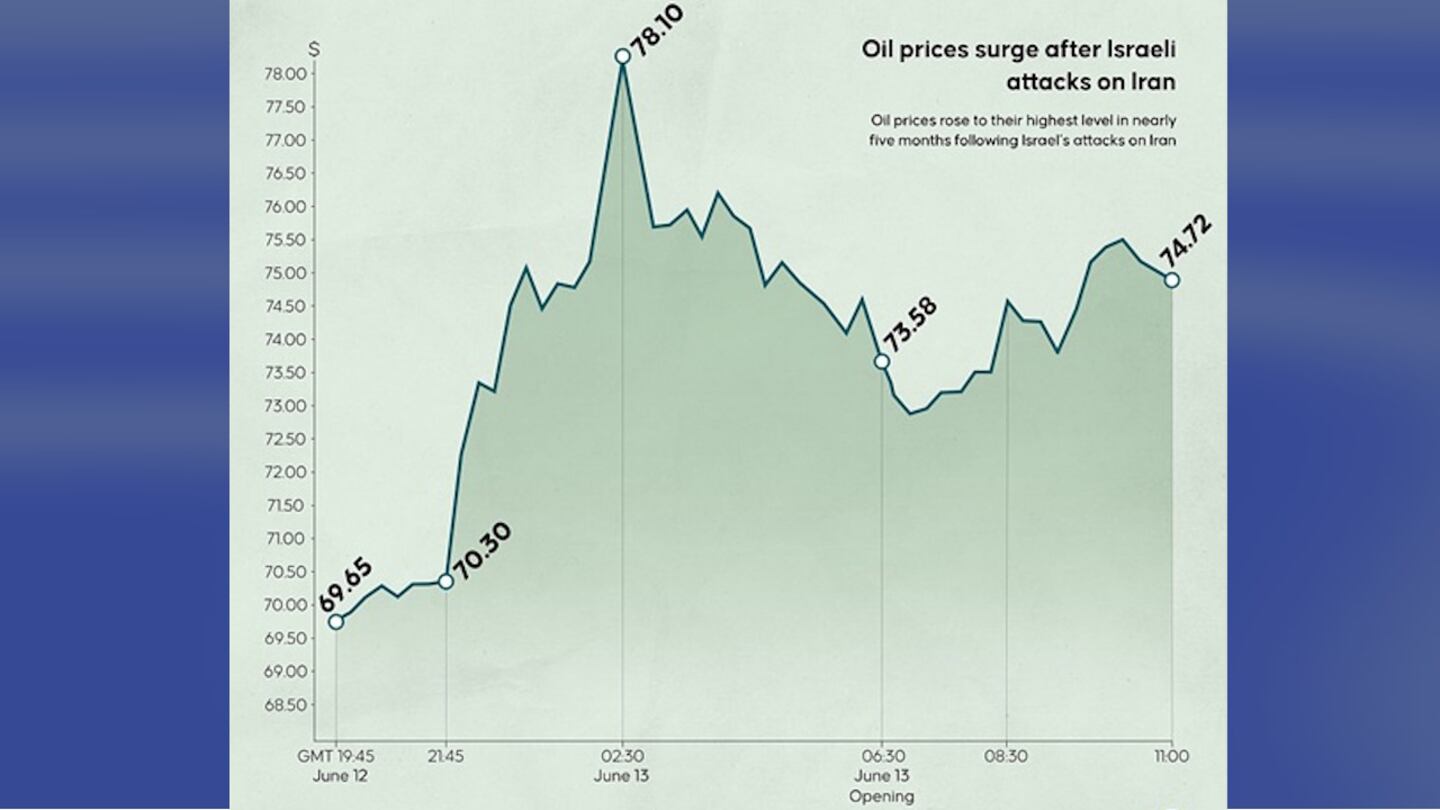Israel launched unprecedented military strikes against Iran, targeting military sites and its nuclear program. The attacks by more than 200 fighter jets killed at least three of Iran’s top military officers. Iran retaliated later in the day, launching missiles toward Israel.
The military action on Friday appeared to be the most significant attack against Iran since that country battled Iraq during the 1980s.
🚨All of Israel is under fire as Iran fires projectiles🚨 pic.twitter.com/eqEGzQMiCc
— Israel Defense Forces (@IDF) June 13, 2025
Hours after Israel’s attack, top military officials said it began intercepting Iranian drones that were launched in retaliation. Officials said that more than 100 drones were launched toward Israeli territory.
The two nations have exchanged volleys of strikes before, but this was the first time Israel successfully hit Iran’s nuclear facilities. According to four senior Iranian officials, Israel attacked at least six military bases around Tehran, residential homes at two complexes for military commanders and multiple residential buildings around Tehran.
Iran’s supreme leader, Ayatollah Ali Khamenei, said that Israel “should anticipate a harsh punishment.”
No injuries reported in Tel Aviv
Update 2:46 p.m. ET June 13: Iranian ammunition fell on a community inside Tel Aviv, but no injuries have been reported so far, according to an Israeli police spokesperson.
“A short time ago, the Israel Police received reports of fallen munitions in one of the communities within the Tel Aviv District. At this stage, no injuries have been reported, but property damage has occurred,” the spokesperson said. “Police officers and bomb disposal experts are currently working to isolate the impact sites.”
At least seven sites in Tel Aviv and its surrounding area were hit in the Iranian missile attack, an Israeli military official said.
Missiles launched from Iran toward Israel
Update 2:28 p.m. ET June 13: Israeli military officials said they have identified missiles “launched from Iran towards the territory of the State of Israel. The defense systems are working to intercept the threat.” The military also warned residents, “You must enter the protected areas and remain there until further notice.”
Sirens sounded across the nation and loud booms shook the air as Israeli interceptors could be seen heading toward the Iranian missiles. An Israeli military official said dozens of incoming missiles were detected.
“All of Israel is under fire” from Iranian projectiles,the Israel Defense Forces tweeted on X.
Netanyahu expecting counterattack
Update 1:34 p.m. ET June 13: Israeli Prime Minister Benjamin Netanyahu said officials are expecting a counterattack from Iran after Friday’s attacks.
“There were doubts, people were asking questions, mostly about two things: in regards to our capabilities and in regards to the price we’ll have to pay,” Netanyahu said in a prerecorded video. “Regarding the price — I said there will be a price, and we are trying to reduce it in various ways I will not elaborate on.
“But it is important for me that you citizens will help reduce it by, not being euphoric … and simply obey the instructions (of the Home Front Command) and stay next to safe spaces, because we and you want to minimize harm to life as much as possible."
Israel’s decision ‘not made lightly’
Update 1:30 p.m. ET June 13: Israel’s decision to strike Iran was “not made lightly,” Danny Doron, Israel’s envoy to the United Nations, said during a news conference on Friday.
“The decision to act last night was not made lightly. It followed repeated violations by the Iranian regime, continued deception and an absence of meaningful international consequences,” Doron said.
The envoy said that Israel had “uncovered clear evidence” that Iran was “planning a surprise attack” on Israel.
“Israel could not and would not wait for that moment to arrive,” he said.
2 explosions heard at Fordo nuclear site
Update 12:53 p.m. ET June 13: Nour News, which is located near Iran’s Supreme National Security Council, reported on its Telegram channel that two explosions were heard from the area near the Fordo nuclear facilities site. The media outlet also reported that two ground points in the Fordow area were targeted.
The Fordo nuclear site is located hundreds of yards underground.
Another Iranian general killed
Update 12:31 p.m. ET June 13: Two senior Iranian government officials said Gen. Ismail Ghaani, the Quds Forces commander in charge of the country’s proxies in the Middle East, has been killed, The New York Times reported. Gen. Ghanni replaced Qasem Soleimani, who was killed during a U.S. strike in 2020.
New attacks appear to begin in Tehran
Update 12:26 p.m. ET June 13: Civilian witnesses told The Associated Press they heard what sounded like loud explosions in neighborhoods in the east, west and center sections of Tehran. An AP journalist in the city’s north also heard a blast.
Press TV reported that missiles were intercepted south of Tehran, as the Islamic Republic of Iran Broadcasting (IRIB) reported that west Tehran was being hit by new strikes. Karaj, a city located near Tehran, was also targeted, IRIB wrote.
Oil prices soar, stocks drop after attacks
Update 11:35 a.m. ET June 13: Israel’s military strikes against Iran caused uncertainty on global markets as oil prices surged and stocks tumbled. The reactions came as investors fretted that Israel’s attacks could lead to a larger conflict in the Middle East -- moves that could cause inflation to spike and disrupt the world’s energy supply.
Israel positions troops at ‘all combat arenas’
Update 11:21 a.m. EDT June 13: Officials with the Israeli military said they have begun to deploy reserve forces from various army units to “all combat arenas” throughout the country. The move was made in anticipation of possible retaliation by Iran or Iranian proxy groups after Friday’s early attacks by Israel.
UN Security Council to meet
Update 11:06 a.m. ET June 13: The United Nations Security Council scheduled an emergency meeting to address Israel’s strikes on Iran at 3 p.m. ET on Friday. The meeting was requested by Iran.
The head of International Atomic Energy Agency, Rapahel Grossi, is expected to brief the Council on the extent of the damages to Iran’s main nuclear facility in Natanz and the threats of more attacks on Iranian nuclear sites.
Iran news agency reports 78 killed, 329 injured
Update 9:52 a.m. ET June 13: Iran’s Fars news agency reported that at least 78 people have been killed and 329 others injured in the Israeli attacks. The figures are unofficial, according to the agency, which is affiliated with the country’s Revolutionary Guards.
Russia ‘concerned’ over escalation of tensions
Update 8:59 a.m. ET June 13: Officials in Russia said they were concerned with the escalation in tensions between Israel and Iran.
Spokesperson Dmitry Peskov said the Kremlin also condemned the stepped up attacks, adding that President Vladimir Putin is following the situation.
Israel alerted Trump administration before attack
Update 8:53 a.m. ET June 13: Israeli officials told the Trump administration that large-scale attacks were coming and expected Iranian retaliation would be severe, U.S. officials said. The alert led the United States to evacuate nonessential embassy staff members in the region.
The officials spoke to The Associated Press on condition of anonymity to describe private diplomatic discussions.
German chancellor calls for de-escalation
Update 8:08 a.m. ET June 13: In a statement, German Chancellor Friedrich Merz called on Israel and Iran to “refrain from steps that could lead to further escalation and destabilize the entire region.”
“Germany stands ready to use all diplomatic means at our disposal to influence the parties to the conflict,” Merz said. “The goal must remain that Iran does not develop nuclear weapons.”
Israel must prepare for ‘prolonged operation’
Update 8:05 am ET June 13: Israeli military spokesperson Effie Defrin told reporters that residents must prepare for “a prolonged operation.”
“We will continue operating until the war’s objectives are reached,” Defrin said, adding that Israel is preparing for Iran to respond.
“We know they’re preparing for a response and to fire at us,” he said.
Iran restricts internet access nationwide
Update 7:36 a.m. ET June 13: Iran confirmed that authorities “decided to impose temporary restrictions” on internet access in the country after it was attacked by Israel.
Iran’s telecommunication and information technology department issued a statement that was carried by the state-run IRNA news agency Friday.
“Due to the country’s special circumstances and with the measures taken by relevant authorities, temporary restrictions have been imposed on the country’s internet,” the statement said.
Report: Israel strikes military airport in Tabriz
Update 6:53 a.m. ET June 14: Israel has attacked a military airport in the northwest Iranian city of Tabriz, according to Tasnim, a semiofficial news agency affiliated with Iran’s Revolutionary Guards. The strike occurred in the early afternoon.
Israeli officials have not confirmed the attack.
Israel says it killed Revolutionary Guard missile chief
Update 6:38 a.m. ET June 13: Israel claimed Friday it killed Gen. Amir Ali Hajizadeh, the head of Iran’s Revolutionary Guard missile program.
Iran has confirmed Hajizadeh’s death.
Trump: ‘I gave Iran a chance’
Update 6:33 a.m. ET June 13: President Donald Trump posted on his Truth Social post after Israel attacked Iran early Friday.
“I gave Iran chance after chance to make a deal,” the president wrote, but Tehran “just couldn’t get it done.” Trump said that “the next already planned attacks” could be “even more brutal.” He added that Iran “must make a deal, before there is nothing left.”
2 nuclear scientists killed
Update 6:11 a.m. ET June 13: Nuclear scientists killed include Fereydoun Abbasi, the former head of the Atomic Energy Organization of Iran; and Mohammad Mehdi Tehranchi, a theoretical physicist and president of the Islamic Azad University in Tehran.
3 top Iranian military commanders killed
Update 6:05 a.m. ET June 13: Israeli military officials confirmed the deaths of the three Iranian commanders. According to Iranian state television, the individuals in question were Gen. Mohammad Bagheri, who was head of the armed forces; Gen. Hossein Salami, who was the head of Iran’s Revolutionary Guard; and Gen. Gholamali Rashid, the deputy commander-in-chief of the armed forces.
Iran’s supreme leader, Ayatollah Ali Khamenei, quickly moved to name replacements. Mohammad Pakpour was named the chief of the Revolutionary Guards and Gen. Abdolrahim Mousavi was named the new head of the armed forces. Maj. Gen. Ali Shadmani was named head of the Khatam al-Anbiya Central Headquarters.
Main nuclear enrichment facility damaged
Update 5:45 a.m. ET June 13: Iran’s main nuclear enrichment facility, Natanz, was damaged during Israel’s attack, the Iranian atomic energy agency said.
The attack caused “superficial damage,” according to the spokesperson for the Atomic Energy Organization of Iran.
© 2025 Cox Media Group






























